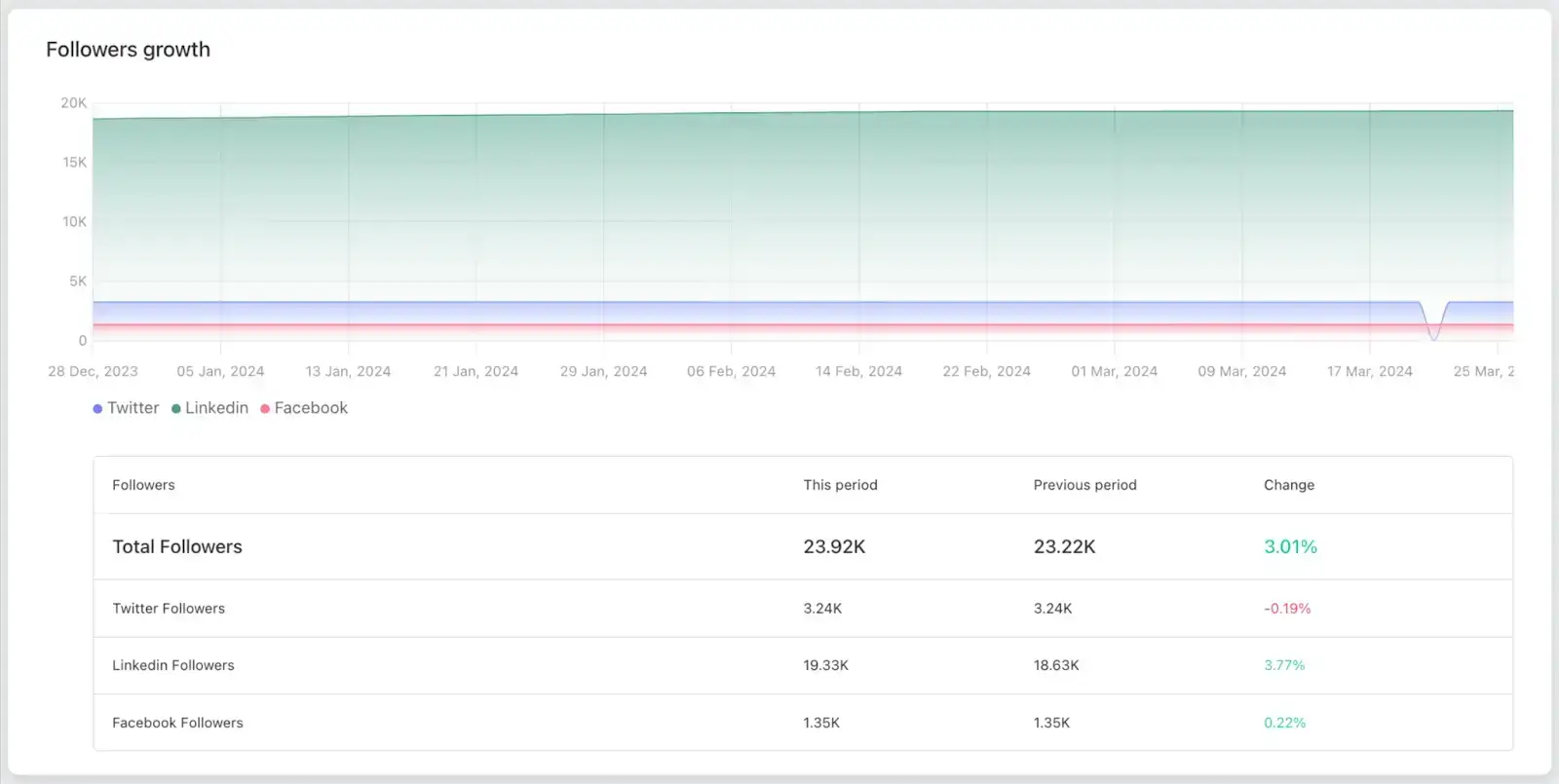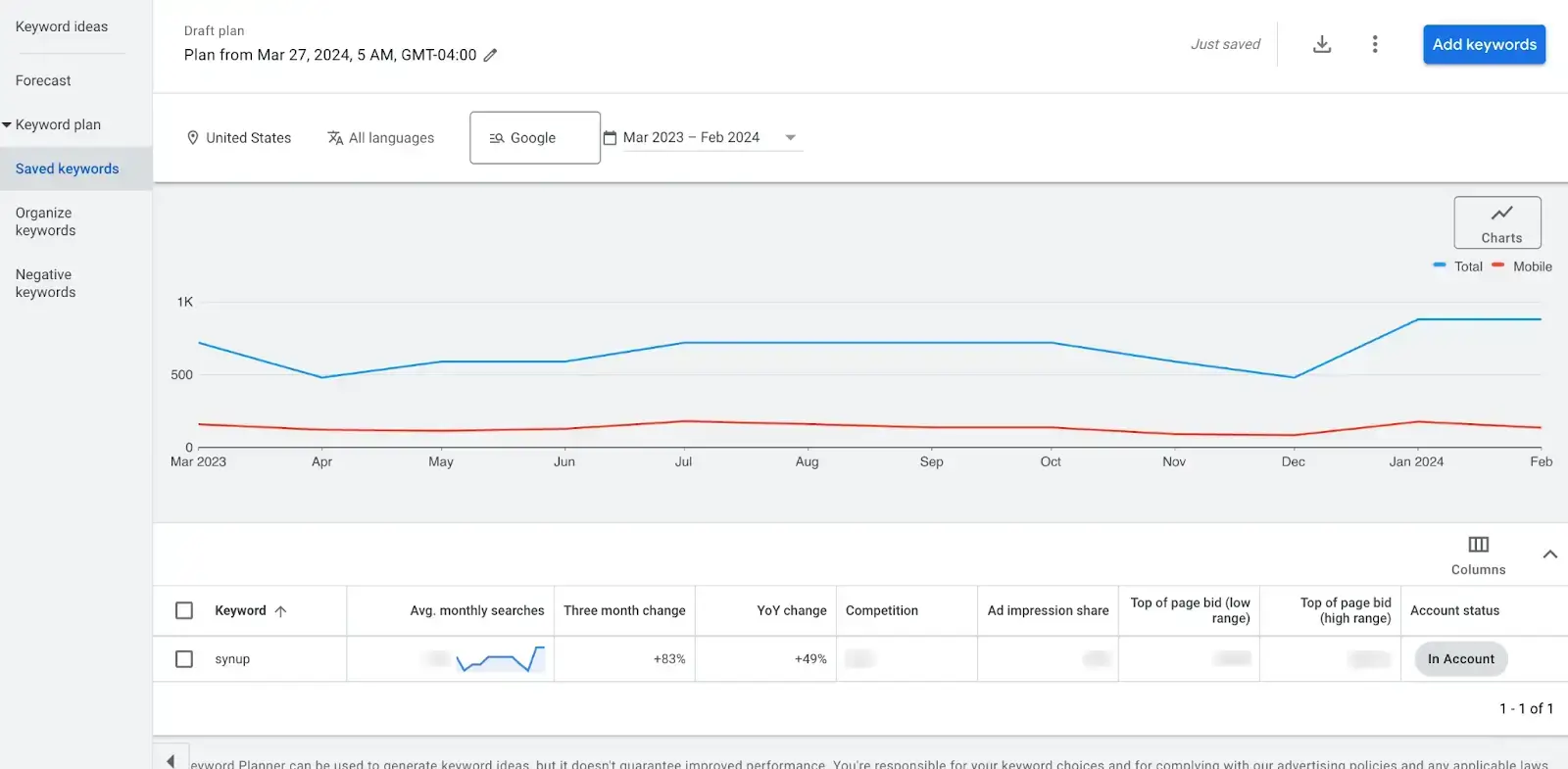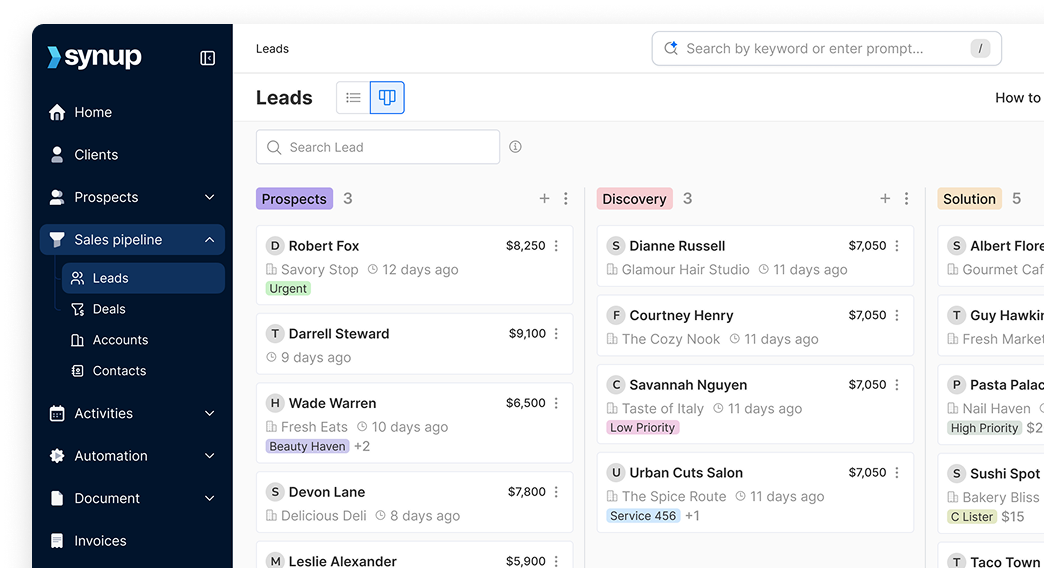How to set and achieve your social media goals? Important KPIs + Do’s and Don’ts
Learn how to up your social media game by tracking the right social media goals. Get tips to exceed your most important goals and KPIs.
Social media looks all fun and games. So, marketing people often assume it is all fun and games… until you get on those quarterly social media performance calls trying to justify the $$$$ spent on social with little to no value to show for it.
Unless you wanna live through that nightmare, you need to define and keep track of your social media goals. But many marketers or social media managers get lost in vanity metrics and meaningless KPIs when measuring their social media performance. How do you make sure you’ve set the right targets for your team? And more importantly, how do you ensure they’re meeting those targets? Let’s go over it in depth.
Why track social media goals?
Because without defining and measuring your goals, you'll just be aimlessly posting into the social media ether. Kind of like shouting into a void.
Social media measurement turns those random efforts into an intentional, data-driven strategy for growth. It allows you to optimize what's working, pivot away from what's not, and ultimately ensure you're getting a real return from your social activities.
And here are a few more reasons:
Helps you stay on top of marketing ROI
Whether you're a business investing real marketing dollars into social, an agency trying to keep clients happy, or just a personal brand, you need to be able to quantify the value social media is providing. You need hard numbers on goals like:
- Leads generated
- Website traffic driven
- Conversions influenced
- Brand awareness/engagement metrics
Keeps you focused on what matters most
Social media can be a distracting rabbit hole of potential tactics, channels, and metrics. Defining and tracking specific goals keeps you laser-focused on your business priorities. It makes you ask the difficult questions:
- Is a certain channel essential for your GTM strategy, or just a time-suck?
- Should you be investing more in video creation based on its impact?
- Should you start focusing on SEO for social media marketing?
Measurement provides the clarity to invest your limited time/resources into working towards the right outcomes.
Improves your social media content
That’s one good (and annoying) thing about social. You can’t just keep doing the same stuff over and over again. Or follow a checklist and pray for results, for that matter.

You need to continuously test, tweak, and optimize your approach. But optimization requires relevant data that answers –
- What content resonates best with your audience? (topics, formats, voice, etc.)
- When are the best times/days to post for maximum visibility and engagement?
- Which hashtags, platforms, and creative drive the highest-quality traffic?
Without goal tracking, you're just guessing. Measurement turns social media into a process of continuous improvement.
Makes you and your team accountable
It's easy to feel like your social efforts are an uphill battle or get discouraged by the lack of immediate results. That will make you feel like you or your team aren’t doing any meaningful work. Quite discouraging, right?
That’s why tracking social media goals and milestones is important. Those percentage increases in followers, leads, or engagement rates provide the motivational fuel to stay consistent. Beyond self-motivation, goal tracking promotes accountability—whether that's to your boss, your team, your clients, or just yourself.
Creates buy-ins from important stakeholders
Social media needs to be an integrated part of your overall marketing strategy, not a siloed tactic. By defining shared goals that roll up to broader business objectives, you can get critical buy-in and alignment across teams.
For example, tracking social's influence on:
- Marketing campaign performance
- Product/service launches
- Customer support/service interactions
...can facilitate smoother collaboration between social media managers and their counterparts in other marketing roles, products, customer service, etc.
The bottom line – Smart goal-tracking bridges the gap between just winging it on social media and making disciplined, informed decisions that take your business forward.
If you don't know where you're trying to go on social, you'll just be spinning your wheels. But establishing and measuring meaningful goals turns those random efforts into a high-impact, ROI-driving engine for your business.
Now, on to the crux of the matter:
How to define and set your social media marketing goals?
Social media goals don’t just come out of thin air. In fact, you don’t need to rake your brains to figure out what your social goals are. First things first–
1. Know your overarching business goals
What are you trying to achieve at the highest level for your business? Get very clear on your annual revenue targets, customer acquisition goals, target markets, product roadmap, etc. Social media functions in service of these big-picture priorities.

2. Break it down into quarterly marketing goals
With the annual business plan in mind, work backward to define your high-level quarterly marketing goals like
- Number of new qualified leads to generate
- Website traffic and engagement metrics to hit
- Target launch milestones for new product/service releases
- Customer retention/loyalty benchmarks
These core goals will set the direction for all your marketing activities, including social.
3. Identify Where Social Media Can Contribute
With your marketing goals set for the quarter, do a crosswalk to determine which social media objectives and tactics can help achieve them. It could be:
- Increasing brand awareness through high-impact video promotions (here social can make a good channel)
- Driving initial lead capture through premium content syndication (you can target high conversion intent content on social)
- Nurturing prospects through automated drip campaigns and retargeting (you can use paid social ads for retargeting. It’s a very popular channel for DTC brands.)
- Generating buzz and demand for an upcoming launch (Social media is a great awareness generation engine)
- Improving customer satisfaction and retention rates (Social can help engage your current audience and thus increase brand loyalty)
Lay out exact, realistic roles social media needs to play to hit your quarterly rocks. You can create something like this:

4. Set SMART Social Media Goals
If you’ve ever learned marketing, you must have come across this fancy-schmancy term called SMART goals. Which essentially extends to Specific, Measurable, Achievable, Relevant, and Time-Bound goals. It’s an ages-old qualifying matrix to tell whether you should prioritize a goal or not. And it works well.
Here's what it looks like adapted for social media:
Specific
Don't leave room for interpretation - your goal needs to be straightforward and clearly defined. For example, instead of "grow our presence on Instagram," try:
"Increase our total Instagram follower count by 20% over the next quarter."
Measurable
This one's huge - your goal absoltuely must be quantifiable through clear metrics. If you’ve decided on increasing instagram followers, check if it’s measurable from all channels.
Achievable
We all want to dream big on social media. But avoid setting yourself up for failure by making your goals unrealistic. Does "getting one million Instagram followers in three months" sound attainable if you're just starting out? Probably not. But a 20% increase is viable for most businesses.
Relevant
This is about making sure your goal ladders up to bigger business objectives, rather than vanity play. If your overall Q2 priority is building brand awareness and authority, then follower growth aligns very well with your business objectives.
Time-bound
Give yourself a a clear timeline and deadline to work towards. Open-ended goals bring nothing but procrastination. See the “by next quarter” added to instagram follower growth goal? Having that time constraint creates urgency and motivation.
When you put it all together using the SMART framework, you end up with goals that are crystal clear, purposeful, and achievement-oriented. You know exactly what you're working towards and how you'll get there.
Which brings me to my call-to-action for you: Pick just one key social media goal that seems particularly vague or lofty in your current strategy. Workshop and define it using the SMART criteria laid out above. You'll immediately notice how much more energized, focused, and motivated it makes you feel to have that crisp direction.
Now I’m sure you’re smart enough to know how it works. But a few things I’d like to add my two cents on:
- Take a look at where your brand currently stands before you decide what’s achievable. Don’t just try to copy competitors when setting benchmarks. What took them 1 month may take you more.
- Every goal should tie back to $$$ but not every goal should be focused on revenue. (For example, your social media intern can’t realistically get you 10 leads in a week. They can, however, target 5+ posts a week with decent engagement levels).
- But at the same time, don’t get lost on vanity metrics. Figure out how to ultimately convert social media success into business.

Once you do that mapping exercise we discussed earlier, you can set prioritized social media goals that tie directly to key business outcomes. Ground them in measurable KPIs (Key Performance Indicators). Here’s what it can look like:
- Boosting referral traffic from social by 25%
- Generating 500 ebook leads via social promotion
- Increasing website conversion rates from social by 15%
- Driving 50,000 video views for an upcoming launch
- Reducing social response times to improve service score
5. Determine What Channels and Metrics to Track
Finally, once your SMART social goals are set, identify the exact channels and metrics you need to track to determine if you're on track. For example –
- Facebook page engagement, paid promotion performance, and conversion rates
- LinkedIn lead capture via sponsored content
- Instagram video view-through rates and audience growth
- YouTube engagement and video distribution metrics
- Dedicated URLs and conversion tracking for campaigns
Having this clear measurement plan in place lets you monitor and adapt based on hard data, not just hunches.
The key is being ultra-intentional and systematic about how you set social media goals. Rather than just chasing vanity metrics, this approach ensures every social effort directly ladders up to making a measurable impact on key business drivers.
Stay focused on outcomes over outputs. Post with purpose. And track your goals relentlessly to accelerate the results social media can deliver.
8 most important social media goals and how to track them
For most organizations, these 8 goals tend to be the top priorities when it comes to developing a high-impact, ROI-driven social media strategy:
1. Brand Awareness
Before you can drive any meaningful business outcomes, you need to build an audience. Increasing your brand's visibility and recognition through awareness-driving tactics lays the groundwork for any other initiatives you take up for social. Before you can drive any other tangible business metrics, you need to increase visibility, recognition, and brand familiarity.
Important KPIs
- Reach and impressions
- Follower growth rate
- Share of voice/mentions
- Video views
How to track brand awareness
If you’re using a social media tool to manage your accounts, you can tap into all top-level analytics in one place. Synup Social has a dedicated analytics section where you can track these KPIs.

- Go to Analytics tab on Synup Social
- Select a channel (“publisher”) or just get data for all
- Compare performance for specific periods
- You can scroll down to see key metrics like Impressions and Followers
- We have every metric aggregated as well as broken down by channels for deeper analysis
Apart from this, you can also monitor hashtag performance and brand mentions with social listening tools like Brand24 and Mention.
2. Engagement
It's not enough to just be seen - your social content needs to spark interactions and develop a relationship with your followers. Engagement is a key signal of resonance. Engagement metrics provide crucial feedback on how well your messaging and creative is actually connecting. Strong engagement rates signal you're breaking through the noise.
But remember, engagement isn’t just a numbers game. “…to know if a content is "good" for the community is by tracking the engagement of the content/ account. Engaging content isn't solely determined by the quantity of interactions, but also by their quality.”, explains Marcella Julia,
Marketing Specialist at Titoma.com
Important KPIs
- Post likes, comments, shares
- Click-through rates
- Engagement rate
- Average engagements per post
- Top engaged/viral posts
How to track engagement on social media
You can get several key engagement metrics from your Synup Social dashboard. It shows you the aggregated engagement trends as well as individual metrics like likes, comments, shares, etc.

You can export this data to an excel file and build custom reports to track specific metrics like avg engagement (total engagement/number of posts) or engagement rate (total engagements/impressions)
3. Traffic
Social media is an incredibly powerful top-of-funnel channel for driving website visits and introductory engagement with your business. You should invest in social media seo to make sure your social media efforts are generating traffic. Then, you need to measure exactly how much traffic it's generating. And what is the quality of that traffic.
SEO and social media go hand in hand
Apart from driving direct traffic, social media seo optimization also helps you drive traffic from organic searches. A good social presence indicates that your brand has authority and also engages regularly with your target audience. That’s why social signals form an important ranking factor for Google.
Important KPIs
- New users by source/medium
- Click metrics on social posts
- Landing page traffic metrics
How to track traffic from social media
The best way to website traffic and related metrics on social is your Google Analytics account. Here’s a step-by-step process to track social medai traffic on GA4:
- Under the life cycle report, go to Acuqisition > Traffic Acquisition
- You will find the traffic from organic social as a channel. You can add a filter for only organic social.
- Next, add a secondary dimension for source/medium and you will see the specific social channels the traffic came from.
- Pay attention to the quality of traffic through metrics like bounces, engagement rate, and avg engagement time.
- You should also keep auditing your social media SEO strategy from time to time to ensure you’re optimizing for organic searches as well.

4. Brand Reputation
How your brand is perceived significantly impacts all your other goals. Social gives you a direct line into reputation monitoring and proactive customer experience management.
Important KPIs
- Brand Mentions
- Share of voice
- Sentiment analysis
How to track brand reputation
There are several tools that help you track brand mentions and public sentiment around your brand. You can try BrandMentions, MonkeyLearn, Idiomatic, and Brandwatch.
Another thing you should keep track of is your online reviews and customer feedback.
Synup also helps you monitor and manage all your reviews in one place and analyzes customer sentiments based on those reviews.

You should also track the search volume for your branded terms to track whether social interest in your brand has grown over time. You can use the Keyword Tool in Google Ads or any SEO platform you use.

5. Lead Generation aka Conversions
While social media provides invaluable upper-funnel marketing benefits, its ability to generate new, qualified leads for your sales pipeline is one of its most tangible ROI drivers. It will reveal social's strategic value for feeding the revenue engine of your brand beyond just awareness tactics.
Social can be a great lead generation engine for all sorts of brands. Instagram and Facebook are successful with DTC and eCommerce brands. LinkedIn is a great channel for B2B brands looking to target specific customers.
Important KPIs
- Form completions
- Cost per lead
- Lead quality scoring
How to track conversions from social media
First, define what you consider a lead. It could be a form filled by someone after seeing a social media post or a demo booked or final purchase made by a user. You can track all your these conversion actions on your Google Analytics dashboard. Here’s how:
- Go to the traffic acquisition report for social that we discussed earlier.
- Next, check the conversion actions (aka events). You can look at all conversion actions or a specific action and map it against different social channels.

6. Community Engagement
Some of the most valuable brand-client relationships get fostered through supportive, engaging social communities. But you need to measure participation. You can create communities on different social platforms such as Facebook Groups, Twitter chats, Whatsapp Group, Telegram, and more
Important KPIs
- Community membership: how fast your community is growing
- Active contributors: Daily or monthly active users of your community
- Response rates and time
How to track community engagement
There are community management tools available for major platforms. You can use Grytics for Facebook and Microsoft Teams, Keyhole for Twitter groups, Wato.ai for whatsapp. These tools help you manage your communities as well track key engagement metrics.
7. Revenue Growth
At the end of the day, all your social efforts need to be contributing to tangible revenue returns. You need to track the bottom line impact of your social media efforts to get those “YES”s from your stakeholders.
Important KPIs
- Traffic-to-lead ratio
- Sales/conversion attribution
- Customer lifetime value
How to track revenue from social media
You can use data from your CRM as well as Google Analytics to attribute all your incoming business to social.
- Add UTM parameters to all the links you post on social to better attribute the incoming traffic.
- Integrate your CRM with existing social media platform to get first-hand insights on what channels are driving the most revenue for you. Major CRMs like HubsSpot and Salesforce have this capability.
- If you’re an eCommerce brand, you can also directly track monetization metrics in your Google Analytics dashboard.
8. Customer support effectiveness
Most customers won’t wait to contact your support directly tor resolve an issue. Especially the ones who had a negative experience are more likely to take to social media platforms to voice their concerns. With customers flocking to social for service and support, you need to ensure you have an effective system for issue resolution and satisfaction management.
Important KPIs
- Response times
- Issue resolution rate
- Customer satisfaction score
How to track customer service on social
There are customer support tools that help you manage customer issues on various social media platforms like Facebook, X, and Instagram. Sparkcentral, for example, lets you connect with CRM and support software to manage customer conversations happening across all social channels. They have real-time performance and reporting capabilities to improve customer support effectiveness on social.
Should you track custom social media metrics for your brand?
While it’s always a good idea to track general performance goals, not all KPIs or metrics are relevant to your brand. For example, a consultancy may not priortize customer support effectiveness as much as an online eCommerce brand. Similarly website traffic may not be a key metric for a local business; they might be more interested in traffic and CTR on their Google business profile.
“We've set social media goals that reflect our brand's specific needs. For example, we've tracked goals such as solving customer queries through social media and sharing content by users.
We've even tracked the usage of exclusive discount codes that are only mentioned on social media. Setting custom goals allows us to measure what's most important for our business and adjust our strategies accordingly.”, says Diana Zheng, Head of Marketing at Stallion Express
There won’t always be a set-in-stone metric for your specific business issues. So, you’ll have to create custom metrics to track your goals.
“I've often tracked custom social media goals tailored to specific brand objectives and campaign initiatives. For instance, for a client in the ecommerce space, we implemented a custom goal tracking system focused on measuring social media driven website traffic, product page views, and ultimately, online purchases.
By aligning social media efforts with these custom goals, we were able to directly attribute revenue to social media campaigns and optimize strategies for maximum impact.” adds Shubham Singh, Content Marketer & Researcher at Demand Sage
Where MOST brands miss out when it comes to social media goal tracking
Most brands track performance and goals. But once you deep dive into this whole universe of metrics and KPIs, you get overwhelmed and start losing sight of the big picture. A few things to take care of:
- Simply tracking your absolute metrics isn’t enough. You need benchmarks (based on industry average or past performance) to compare those metrics. For example, a gain of 200 followers in week 1 doesn’t tell you any story about your social media performance. But if you compare it to previous week’s follower gain and get WoW growth, you will know whether you missed the mark this week or need to make any further improvements to your content. The same goes for month over month and year over year comparisons.
- Most brands will stop measuring just because they don’t have anything to measure against. If you don’t have any benchmarks to compare, just pick an estimate and start. Let yourself fail and then figure out what’s realistically possible for your brand.
- Brands will start measuring social media goals but do it in a haphazard and irregular manner. Sometimes it’s a weekly performance report, sometimes quarterly. This irregularity blurs the overall picture of your social media performance. Even if you don’t have weekly performance calls, pick a recurring period and try to stick to it.
Summing Up…
Your social media goals should align well with your overall business objectives. The main reason for tracking social media performance is not just evaluation but also improvement. You need to not only work on doing better with the hard numbers, but also use them to improve your overall content and positioning on these platforms.
Synup Social helps you stay on track with your social media performance and also uncover areas where you need to do better. It’s like a cool sidekick for social who also doubles up as your neighborhood nerd. Get a demo!




